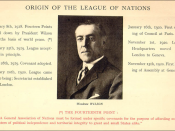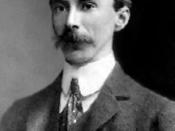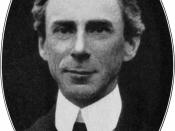The League of Nations Union (the League) was established in 1918 to "promote international cooperation and to achieve international peace and security" and operated until 1945. The unprecedented slaughter of the 'war to end all wars' was the impetus for a diversion from the realist approach to relations between states towards an idealist conception, which applies liberal theory to international relations. The League worked towards collective security, multilateral disarmament, recognised and respected international law, and world government as means of attaining world peace. This paper will discuss these ideas and examine their feasibility and will show that although realism provides an effective criticism, application of idealist conceptions would provide a mechanism for world peace.
The League of Nations Union was comprised of a Secretariat, Council (for Great Powers) and a General Assembly (all members), bound by a Covenant which set out its aims, ideals and regulations, to create a "temple of lasting peace built on the foundations of secure justice."
Idealists conceived of collective security as a means of organising world affairs to prevent great wars and deterring aggressors. The Members of the League would "undertake to... preserve as against external aggression the territorial integrity and existing political independence of all Member of the League under Section 10 of the Covenant." Nations would act first diplomatically, then economically through sanctions, and if this was insufficient military forces from all the states would be used against the aggressor. Collective security was held to be an achievable ideal which would be fulfilled by nations for towards a peaceful international system "as a safeguard against war."
The greatest flaw in the idea of collective security is its conflict with "the concept of interest defined in terms of power" which realists claim is the only motivator in international relations. Realists mocked the idea of...


